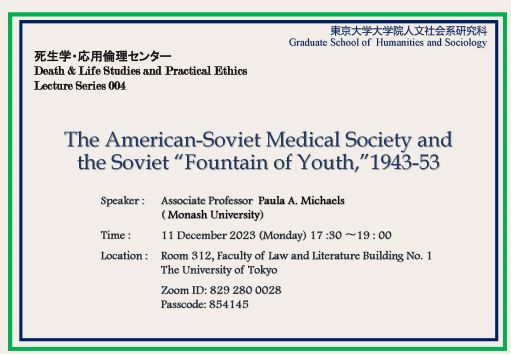The American-Soviet Medical Society and the Soviet “Fountain of Youth,”1943-53

【日時】2023年12月11日(月) 17:30-19:00
【会場】 東京大学本郷キャンパス 文学部法文1号館312教室
【オンライン会場】Zoom ID: 829 280 0028 (Passcode: 854145)
【参加について】参加無料・事前予約不要
【使用言語】英語(通訳なし)
【主催】東京大学大学院人文社会系研究科 死生学・応用倫理センター
【共催】東京大学 国際人文学プロジェクト
北海道大学スラブ・ユーラシア研究センター「国際的な生存戦略研究プラットフォームの構築」
科学研究費補助金・基盤研究(B)21H00500「近代ユーラシア高緯度帯の風土病とそのパンデミック化
【助成】布施学術基金
※この講演会は布施学術基金により助成を受けています。
講師紹介 Speaker : Paula A. Michaels (Associate Professor, Monash University)
Paula Michaels's work situates the history of Soviet medicine in a pan-European and global context. She is keenly interested in the probing the ways that politics impinges on the clinical encounter and on professional networks. Michaels has published widely on colonial medicine, the history of childbirth and, most recently, medical internationalism during the Cold War. She is the author of two prize-winning books and numerous articles, and her work has been supported by the Guggenheim Foundation, the Gerda Henkel Foundation, and the US National Institutes of Health, and the National Endowment for the Humanities, among others. https://research.monash.edu/en/persons/paula-michaels
Abstract
Through its promotion of scientific exchange and cooperation, the American-Soviet Medical Society (ASMS) (1943-48) embodied the highest aspirations of medical internationalism to promote mutual exchange and understanding. It emerged from the interest among progressive US physicians in the USSR’s socialized medical system and grew, amid the amity of wartime alliance, to embrace thousands of members. Many of most active US participants were born in Russia; their knowledge of the language propelled them to visible roles as intermediaries between the Soviet Union and US officials, medical professionals, and the general public. Of course, the opportunity for cooperation was short lived, with the Cold War’s onset coming hard on the heels of the Second World War’s end. By 1948, the Soviet retreat from engagement with the West and the rise of McCarthyism in the US spelled the death knell for Soviet-American medical cooperation until 1953, when Stalin’s death ushered in a new era.